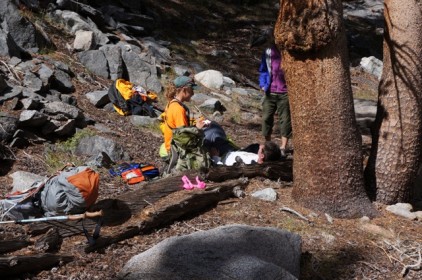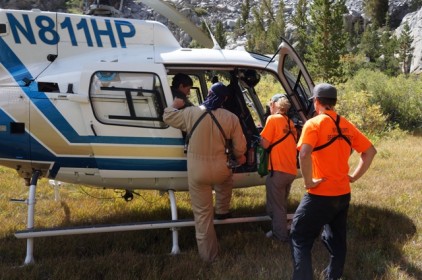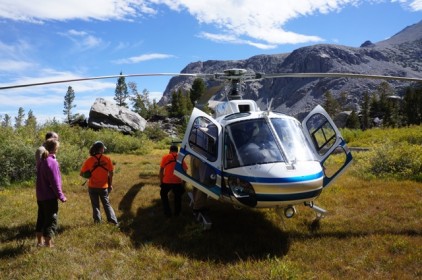Severe altitude sickness can strike indiscriminately and without warning, affecting experienced mountaineers and first-time hikers alike. On the morning of Sunday, September 1, dispatch received a call about a patient in the early stages of High Altitude Pulmonary Edema at his 11,000ft camp by Elinore Lake in the South Fork of Big Pine Creek. Dispatch was informed that the patient was with three friends who were going to monitor his condition and help him to descend, and that they would call again if they needed help.
The call to action came early the next morning: after more than 24 hours of painstaking downhill travel, rappelling, limping, crawling, and finally being carried by his friends, the patient had reached a critical stage. He was essentially drowning in the fluid accumulating in his lungs and could no longer move without extreme and dangerous effort. The reporting party, one of the patient’s companions, had hiked down before dawn to reach cell service and could not give an exact location, but said that the patient and the other two friends were going to try to make their way down the Elinore Lake drainage to the junction with the main trail at Willow Lake.
Two rescuers started out immediately and requested helicopter assistance due to the patient’s serious and worsening condition. A CHP helicopter arrived soon after, but without precise coordinates was unable to locate the patient immediately. The helicopter searched from above while the team on the ground stepped up their speed and made it to Willow Lake, where the reporting party was located. He was able to provide a good approximation of his friends’ current location, and within minutes the ground team found the group about 200m upstream from the trail. The helicopter searched for a landing zone while the rescue team, composed of two Wilderness EMTs, assessed the patient and started O2 therapy.
The helicopter was able to land within 50ft of the patient. Even so, due to his weakened condition, it took rescuers about 15 minutes to walk the patient to the helicopter and get him on board. He was flown to Northern Inyo Hospital, where he was diagnosed with several High Altitude Pulmonary Edema and given treatment. He has since made a full recovery.
We recognize and honor the incredible efforts of the patient’s friends to assist him down to lower elevation — they are the true heroes of the story.


